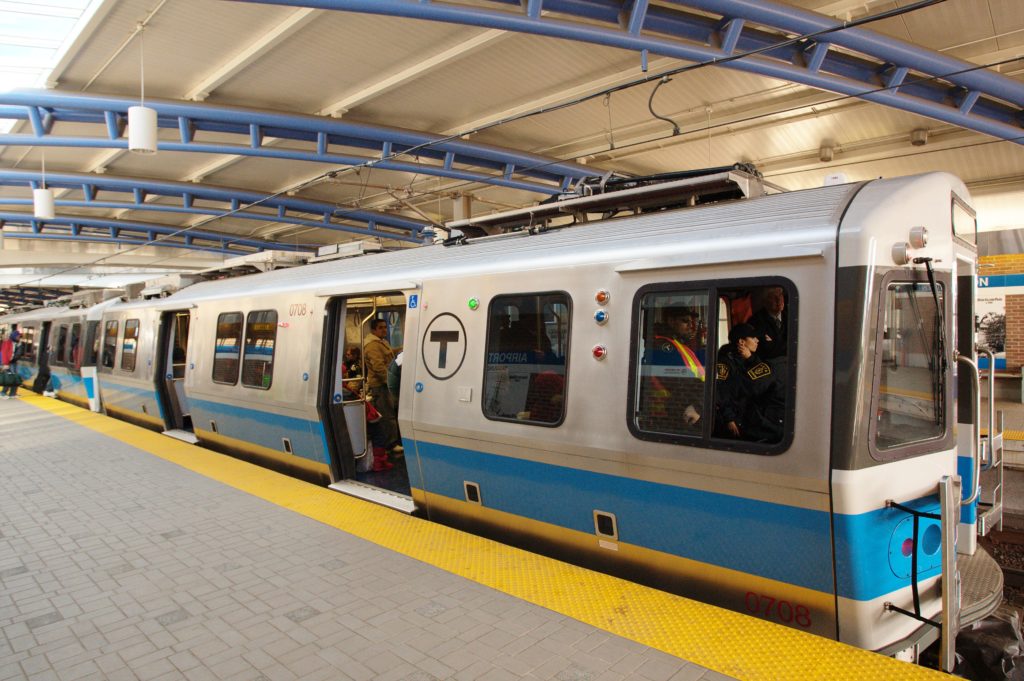
The T has completed some of its infrastructure and financial goals, but it has a long way to go to meet its accessibility and climate goals. The Blue Line is especially vulnerable to flooding during winter storms. Photo: Derek Yu
As a daily T rider and a transit advocate, I often question how well the MBTA is doing its job. Is my delayed Orange Line train just one bad morning, or is the system failing on a deeper level? My winter 2019 rides seem better than my winter 2015 rides, but is that just because we don’t have feet of snow falling on a weekly basis?
We’re able to investigate these questions thanks to the MBTA Fiscal and Management Control Board. This oversight body was created by Governor Charlie Baker and the state Legislature after the T failed Greater Boston during the winter of 2015. To address the issues that led to that failure, the Control Board released a strategic plan to repair and modernize the MBTA.
And now, two years after the strategic plan was approved, we’re looking into how well the T stuck to its own goals. CLF, along with the Greater Boston Chamber of Commerce and MBTA Advisory Board, published those findings in our 2019 Accountability Report.
The report focuses on four categories: fiscal sustainability, infrastructure, customers, and management, scoring the tasks based on whether or not they are on schedule. While the T has completed some of its infrastructure and financial goals, it has a long way to go to meet its accessibility and climate goals.
The T is on its Way to Financial Stability
The T needs money to implement its strategic plan. In a positive sign for future improvements that require investment, the system has taken significant steps toward stabilizing its budget. In the most recent fiscal year, which ended on June 30, 2018, the T balanced its budget for the first time in a decade. It’s also on track to meet its goal of raising $100 million in non-fare revenue by fiscal year 2021.
Financial stability means that the T can act on its backlog of repairs and fund long-overdue projects, such as designing stations for the first phase of the Green Line Extension to Somerville and College Avenue in Medford and a centralized call center for The Ride, the T’s door-to-door paratransit service. Stability also means the MBTA should be able to make good on its goals for accessibility and climate resilience.
The MBTA is Failing Riders with Mobility Needs
No rider should face a non-working elevator or escalator, be unable to board a bus because the stop isn’t wheelchair accessible, or have no place to sit because there isn’t a bench to rest on while waiting for the bus or train.
The MBTA’s Strategic Plan set ambitious goals to ensure accessible service for those with mobility needs. But the MBTA is far behind schedule in meeting these targets. It hasn’t assessed bus operators’ compliance with accessibility standards. It hasn’t determined what additional technology may be needed to facilitate full use by all riders. And it hasn’t improved bus stops or made necessary fixes to elevators and escalators.
The MBTA must make accessibility a top priority so that anyone who wants to (or has to) ride public transit is able to – not to mention that the MBTA must comply with federal accessibility and civil rights laws. Everyone has a right to full access to the T, regardless of their physical abilities and mobility needs.
Our Public Transit Isn’t Ready for Climate Change
While accessibility issues are an everyday concern for many riders, climate impacts like flash flooding can impact the whole system. In January 2018, the MBTA shut down the Aquarium Blue Line station because of flooding from a major winter storm. It’s not just the Aquarium stop at risk – many stations along the Blue Line corridor end up under water during winter storms. With snow and rainstorms only getting stronger and more frequent, there is no time to wait. The MBTA has yet to create the system-wide plan needed to address climate and weather vulnerabilities. It must act now to protect riders and infrastructure.
The MBTA must prioritize continued financial investment, accessibility improvements, and climate resiliency. These goals are a part of the T’s own strategic plan, and they are crucial to creating the 21st-century public transportation infrastructure that Greater Boston’s residents and businesses need to sustain economic growth, meet employer and employee needs, and support a high quality of life. Without these changes, riders will not have the commute that they need or deserve.
As the MBTA moves forward with their budget and investment planning, CLF will continue to advocate for a climate-ready public transit system that works for everyone.



